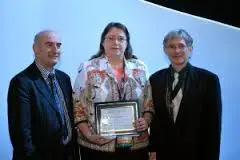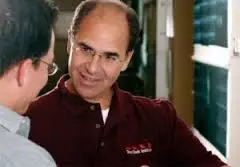Over the past 35 years, Texas Back Institute has received world-wide recognition for excellence and innovation in spine surgery and treatment. Some of the best and brightest orthopedic surgeons and neurosurgeons have joined the practice and, through their efforts, transformed the lives of thousands of patients.
Not long after the establishment of the TBI practice, the founding partners made a commitment to “give back” to the community and medicine around the world. They formed the Texas Back Institute Research Foundation and it is celebrating its 30-year anniversary.
The mission of this innovative foundation is to continually improve care for patients with back pain through research and education. The president of the foundation, Dr. Donna Ohnmeiss, notes, “By performing clinical outcome and other scientific studies and sharing the results of this work, we can have an impact on patient care, not just in the United States, but internationally as well.
 “Education is also very important,” she added. “The cornerstone of our educational endeavors is our spine surgery fellowship program. Orthopedic surgeons and neurosurgeons who have completed their respective residencies train for a year, being exposed to a broad spectrum of spinal problems and surgical techniques, with a particular focus on patient evaluation, decision making, technique and technology.
“Education is also very important,” she added. “The cornerstone of our educational endeavors is our spine surgery fellowship program. Orthopedic surgeons and neurosurgeons who have completed their respective residencies train for a year, being exposed to a broad spectrum of spinal problems and surgical techniques, with a particular focus on patient evaluation, decision making, technique and technology.
“The surgeons also participate in training others through labs and lectures all over the world. We also have many foreign surgeons participating in our observatory fellowships,” she said.
Changes in the Foundation over the Past 30 Years
The mission and core function of the Texas Back Institute Foundation have not changed substantially through the years. However, the programs have evolved.
“Technology such as electronic medical records has allowed us to more effectively merge routine clinical data collection that will lay a basis for large scale internal research studies,” noted Dr. Richard Guyer. “We also anticipate participating in a national spine registry for truly large scale data collection.
“New research opportunities have opened up recently with the access to an open MRI with weight bearing scanning capabilities as well as the ability to scan the cervical spine in multiple positions.
“In late 2015 a spine performance laboratory was created that provides the ability to use high speed cameras, EMG and force plates to evaluate all aspects of gait. Many patients with spinal problems have difficulty walking and this gives us a method to carefully assess movement in these patients. Balance and lifting can also be assessed in the lab.
“Of course with scientific advancement our clinical studies have ranged from pioneering diagnostic techniques to developing surgical techniques from disc replacement, minimally invasive surgery, thoracoscopic surgery and the utilization of robotics in surgery,” Dr. Guyer noted.
The Research Projects of the Foundation are Clinically Oriented
The TBI Foundation enjoys participating in a wide variety of projects. Through collaboration with others, it can participate in basic science studies involving spinal implants.
“The majority of our studies are clinically oriented,” noted Dr. Ohnmeiss. “We have participated in approximately a dozen cervical and lumbar disc replacement studies. Though challenging, this is the most direct means to impact patient care through evaluating diagnostic procedures and treatment interventions.
“We have participated in many outcome studies that have the potential far reaching effects of helping physicians and patients understating the indications and outcomes of various treatments. Some of the work also helps to gain insurance reimbursement for new procedures making these new technologies available to patients, who otherwise may have more limited options.
“This research emanates from both TBI physicians and those from other practices. Some of the research is performed based only on data from the TBI clinic, other publications are based on work with multiple other sites across the country, including FDA studies, or sometimes internationally,” she added.
The Criteria for the Subject Matter of the Research
There are many ideas for very meaningful projects, but unfortunately there are limited resources to support the work. This is one of the greatest challenges the foundation faces.
“This is a problem on a national level,” noted Dr. Guyer. “While back pain greatly impacts a large number of Americans and thus constitutes one of the most expensive problems to treat, very little funding is allocated for spine research.
“To help with project selection, we have recently organized a Research Governance Committee that reviews potential projects and helps to prioritize those to be pursued.”
Education is Critical to the Work of the Foundation
“One of the pillars of the Texas Back Institute Research Foundation is education,” said Dr. Ohnmeiss. “This is in the form of a spine surgery fellowship program, CME accredited conferences, lectures, and visitors.
“The Fellowship program was initiated in 1986 with one fellow. As the clinic has grown, there are five fellowship positions every year. Among approximately 100 fellowships in the US, we are proud to be one of only 16 ACGME – accredited spine surgery training programs. Fellows participate in clinic, assist in surgery, participate in research, and regularly scheduled educational activities such as lectures series, journal club, and interesting case conferences.
“Through these events, the foundation awards CME credits to surgeons, physiatrists, physician assistants, radiology technologists and others annually. We also participate in lecturing at many national and international conferences every year that provide updated education to many spine care providers,” she concluded.
After 30-years, the Texas Back Institute Research Foundation has a proud history of contributing to the advancement of spine specialty. Using this history as a foundation, greater advances will no doubt follow.
For more information on the Texas Back Institute Research Foundation contact Dr. Donna Ohnmeiss, President of the foundation at dohnmeiss@texasback.com.
Donations can be made by sending a check to the foundation and, if desired, donations can be designated to support either research or education. All contributions are greatly appreciated and any amount helps the foundation do work dedicated to helping those with spinal problems.


